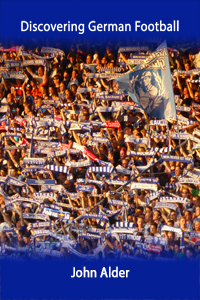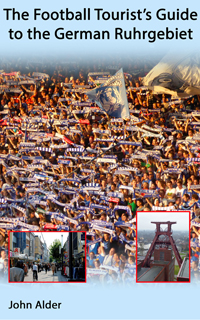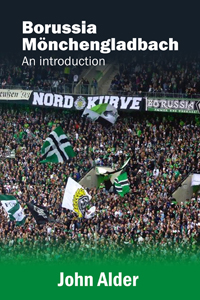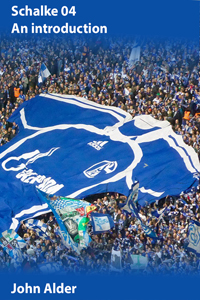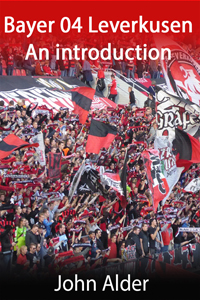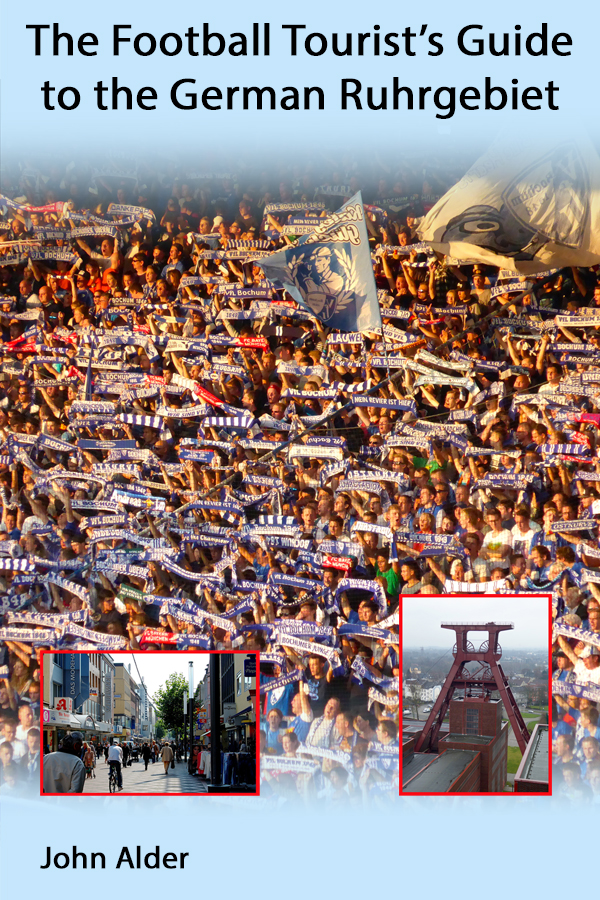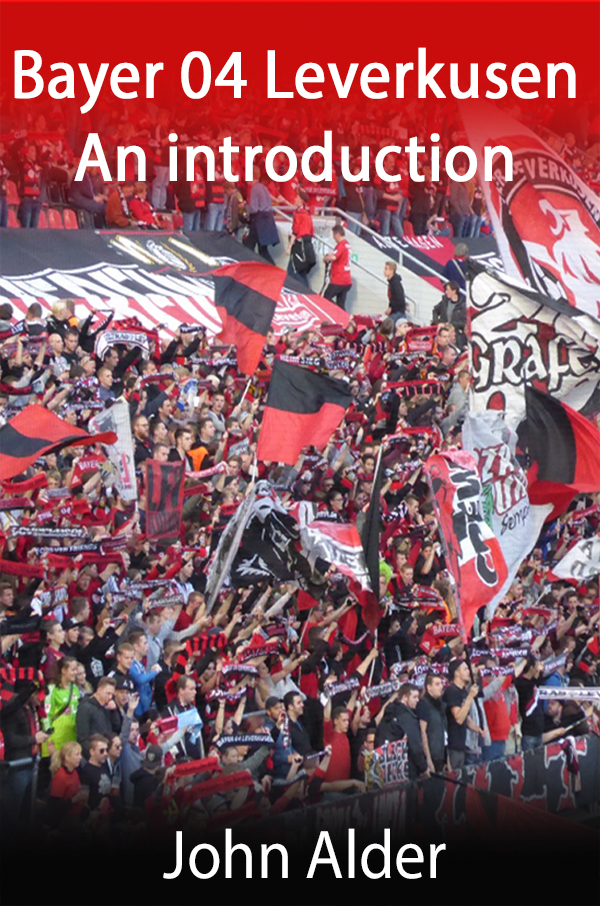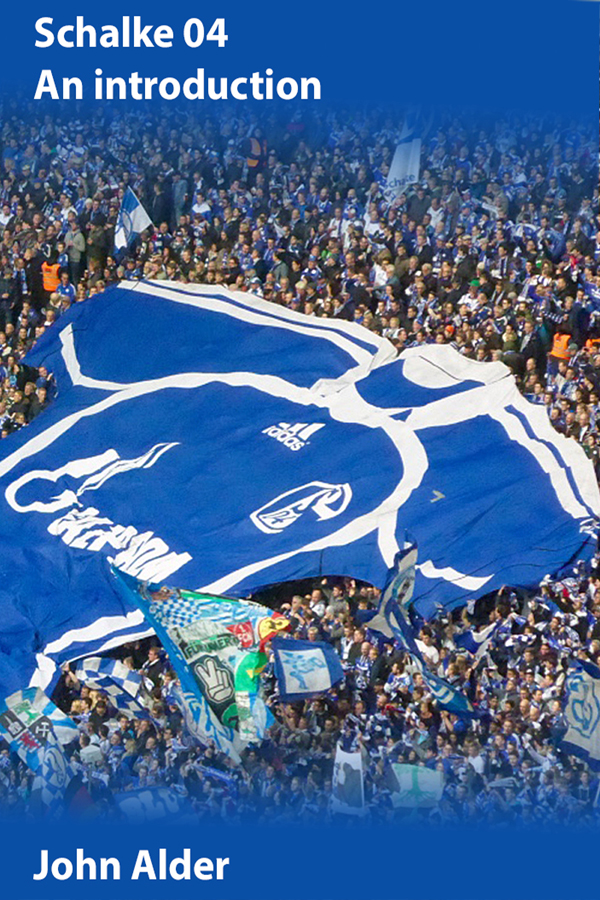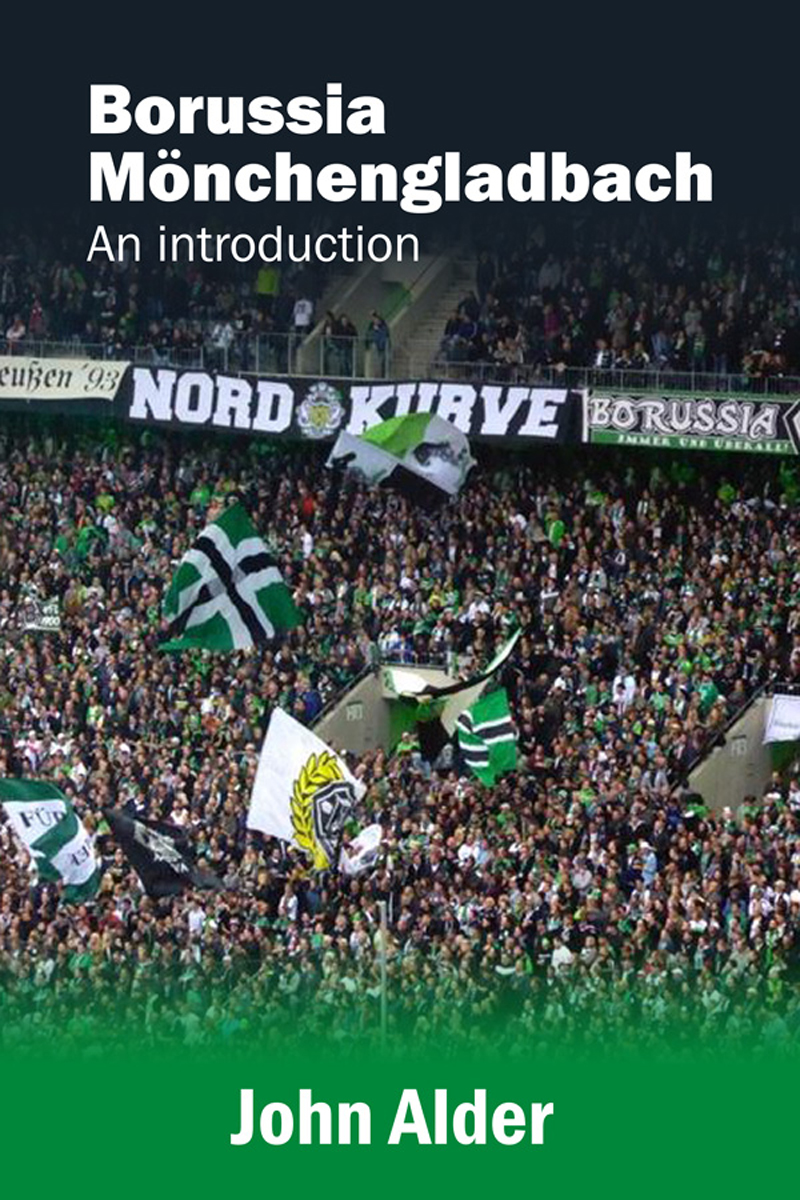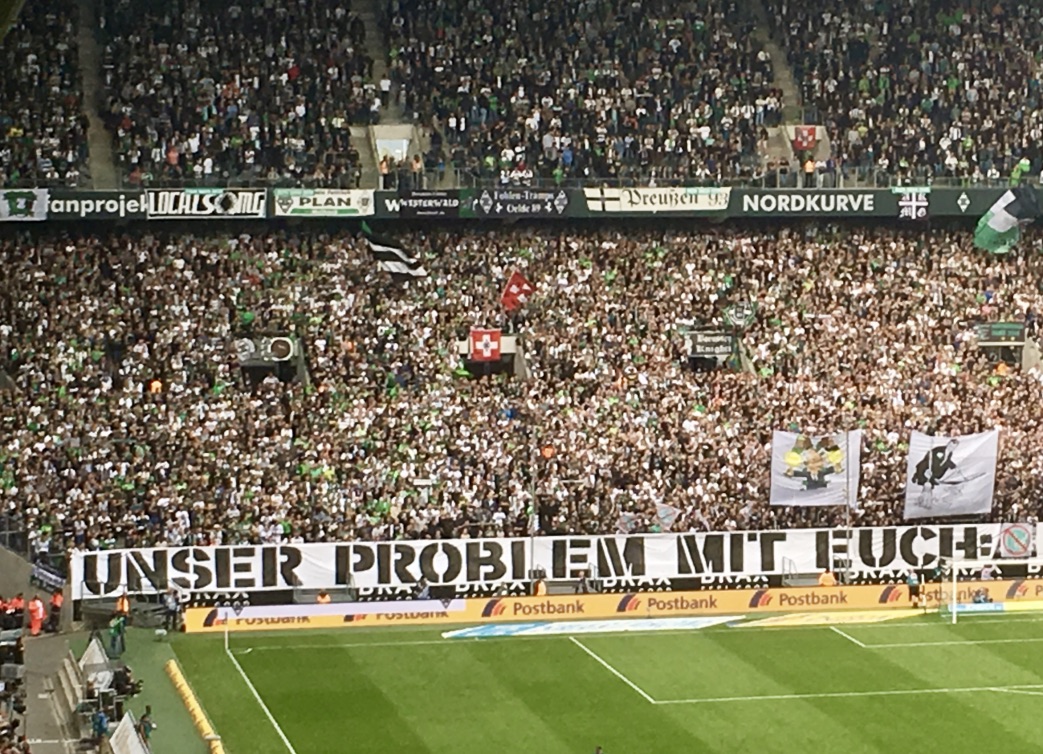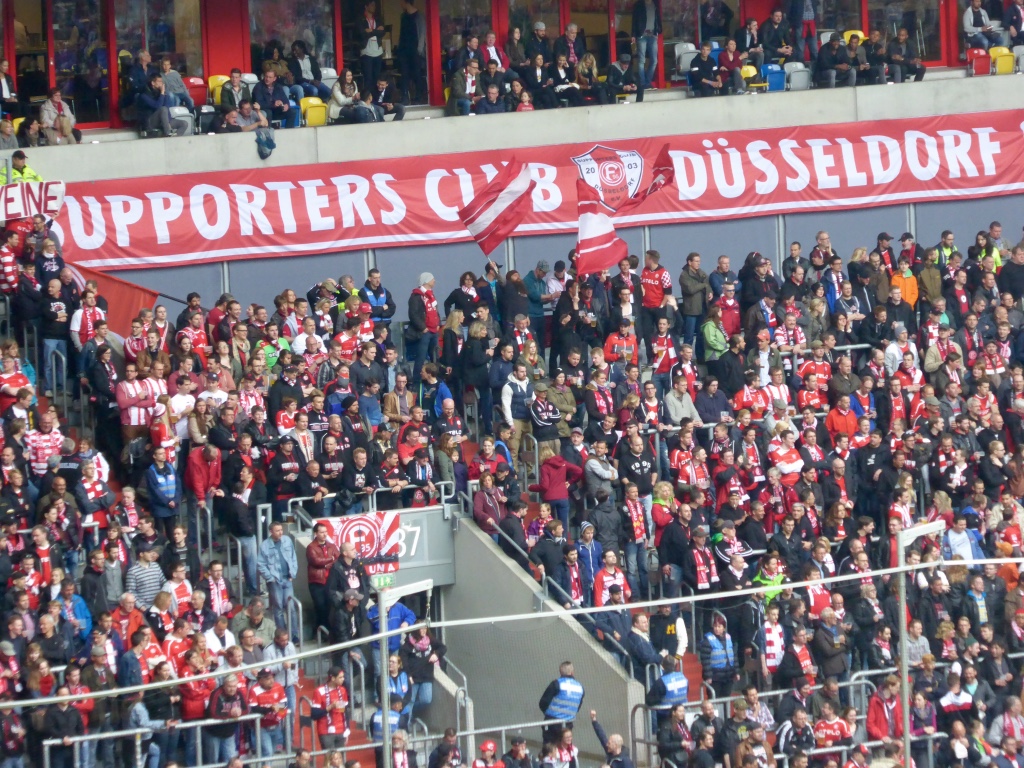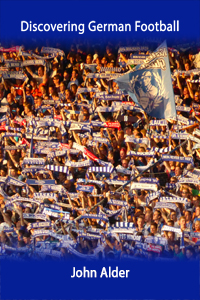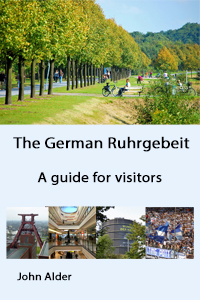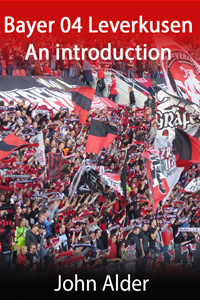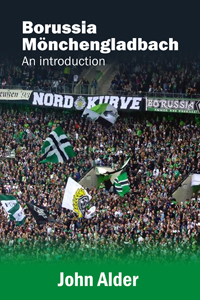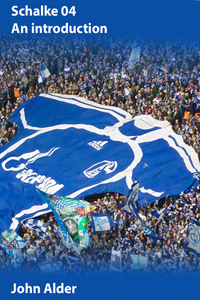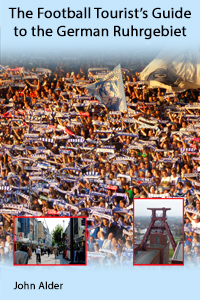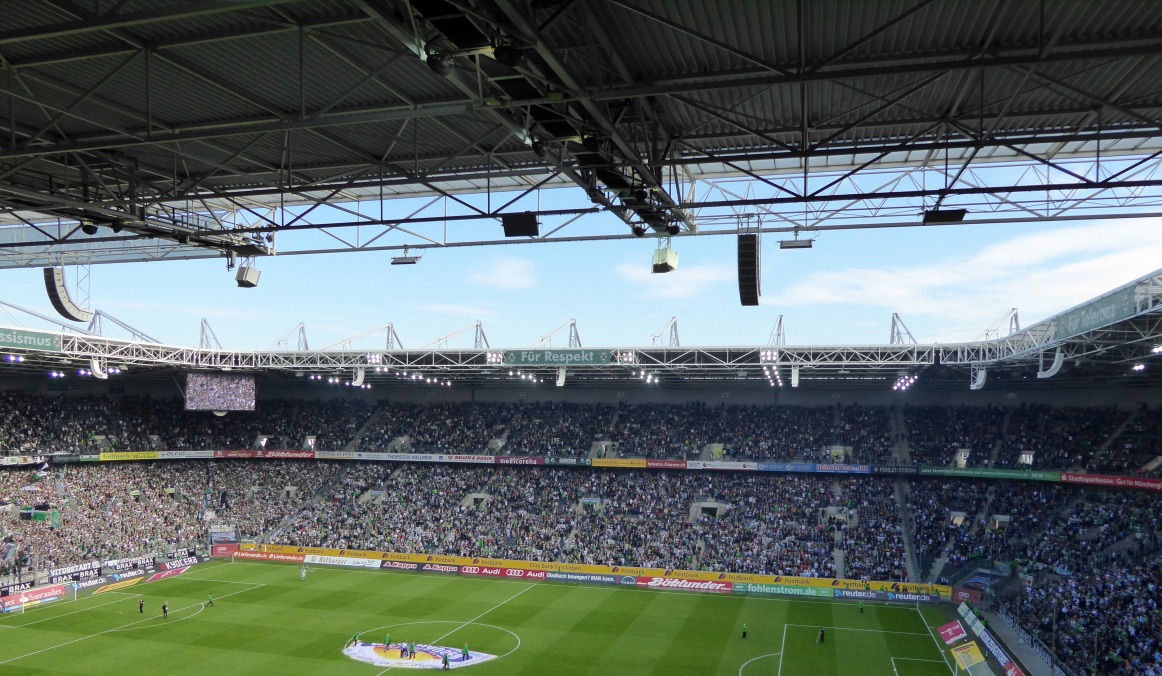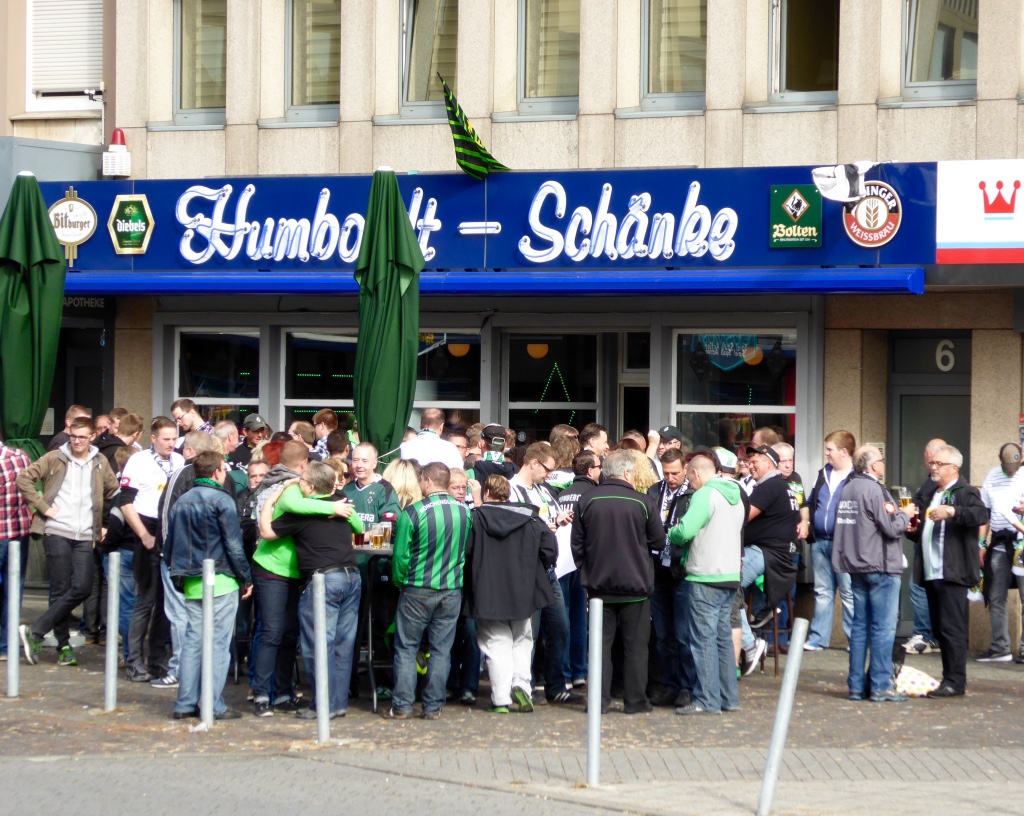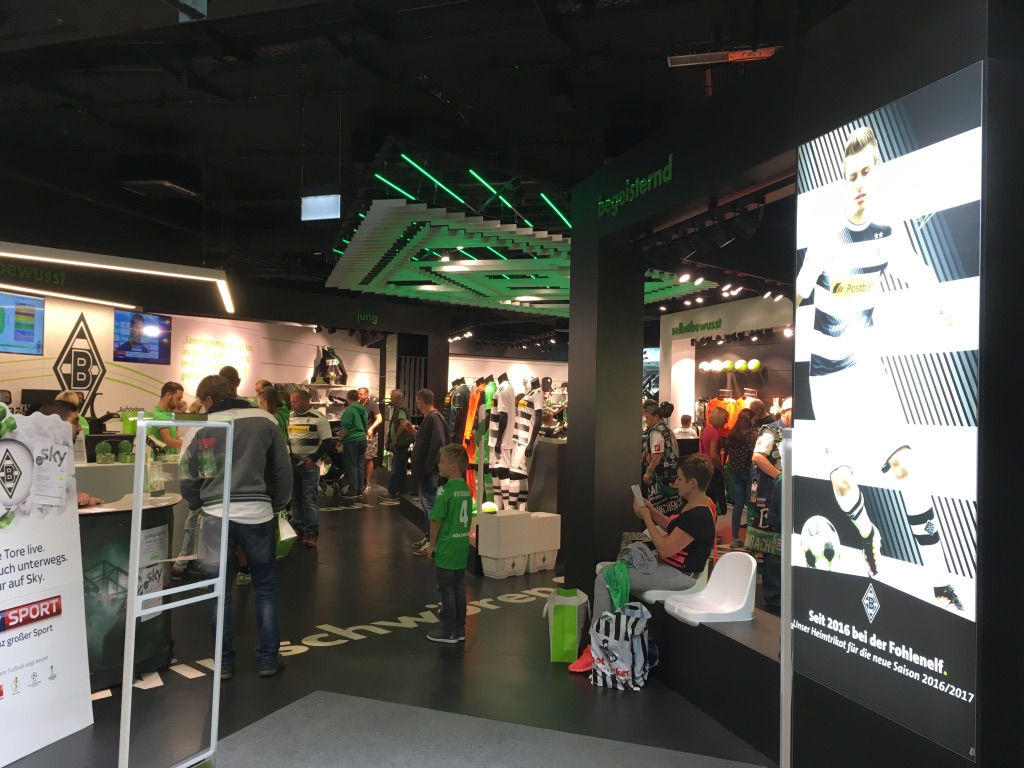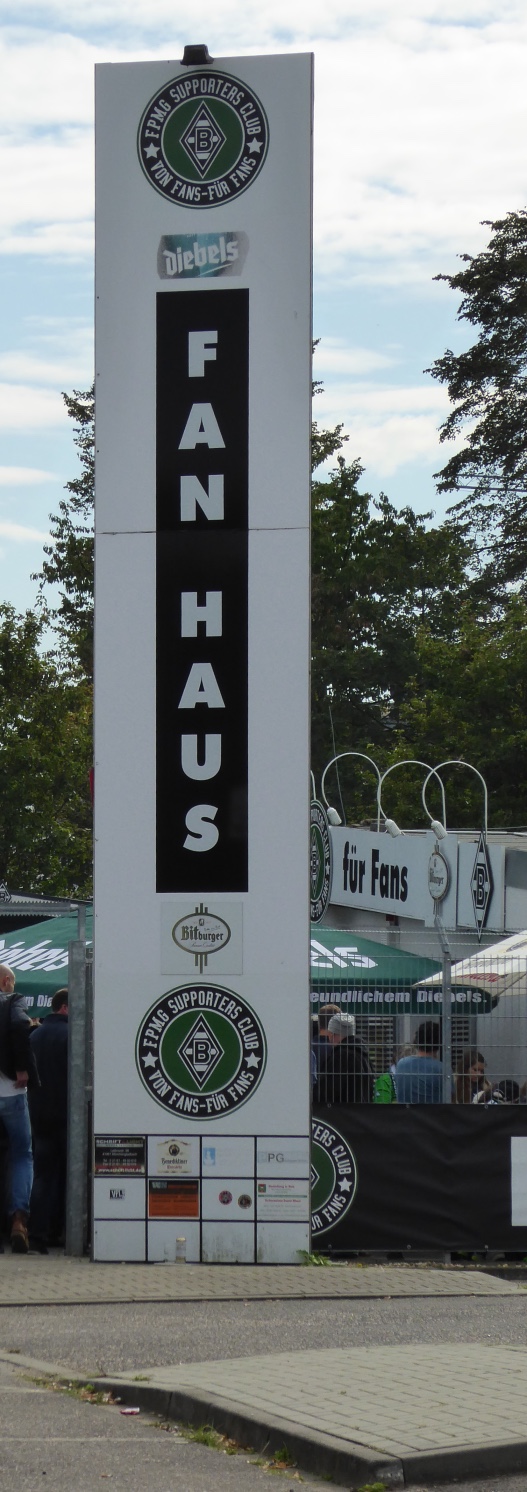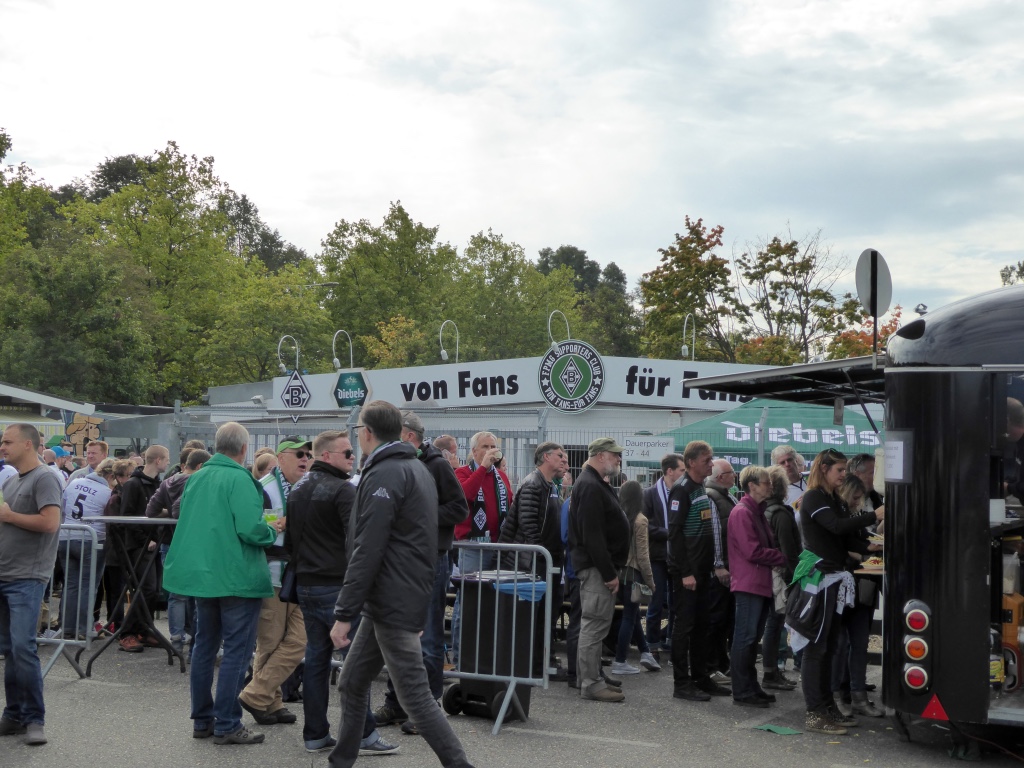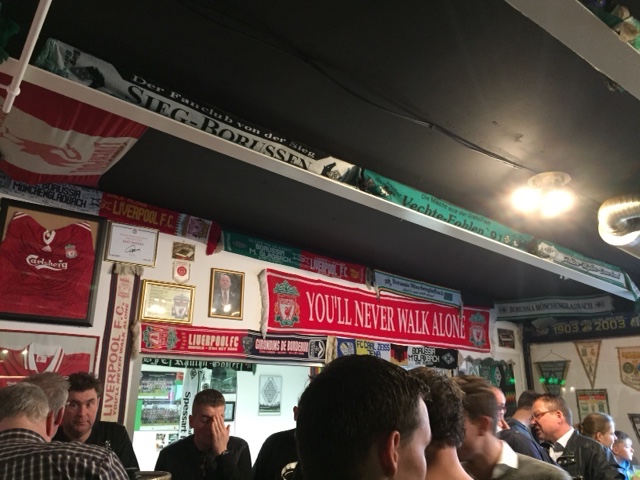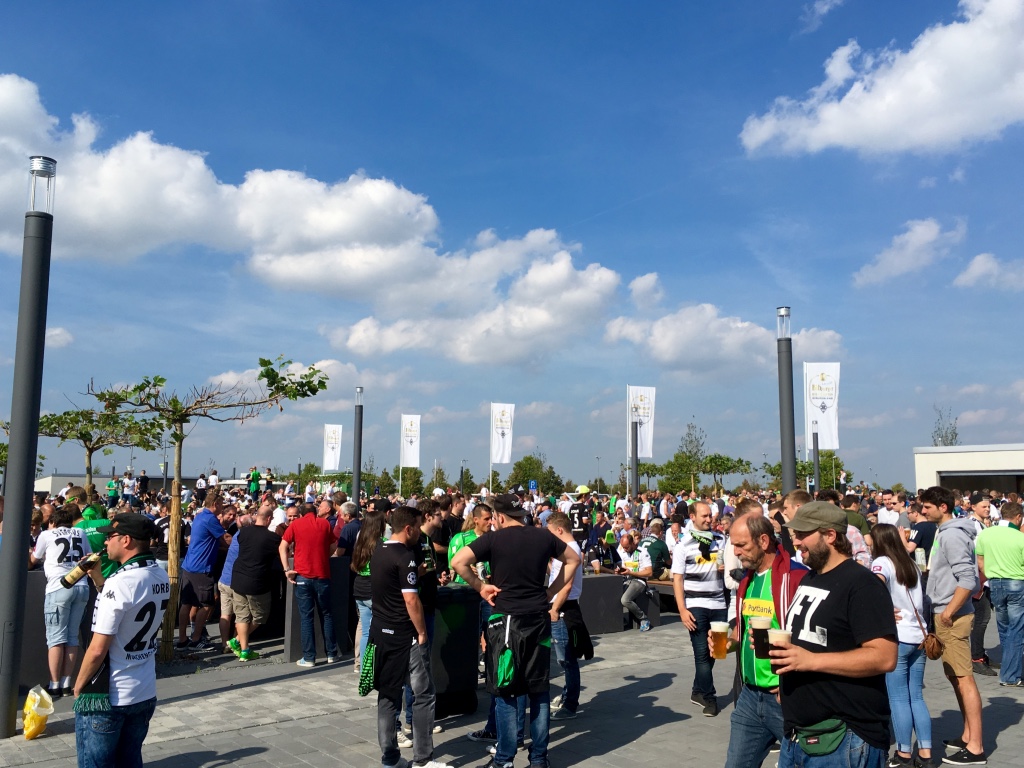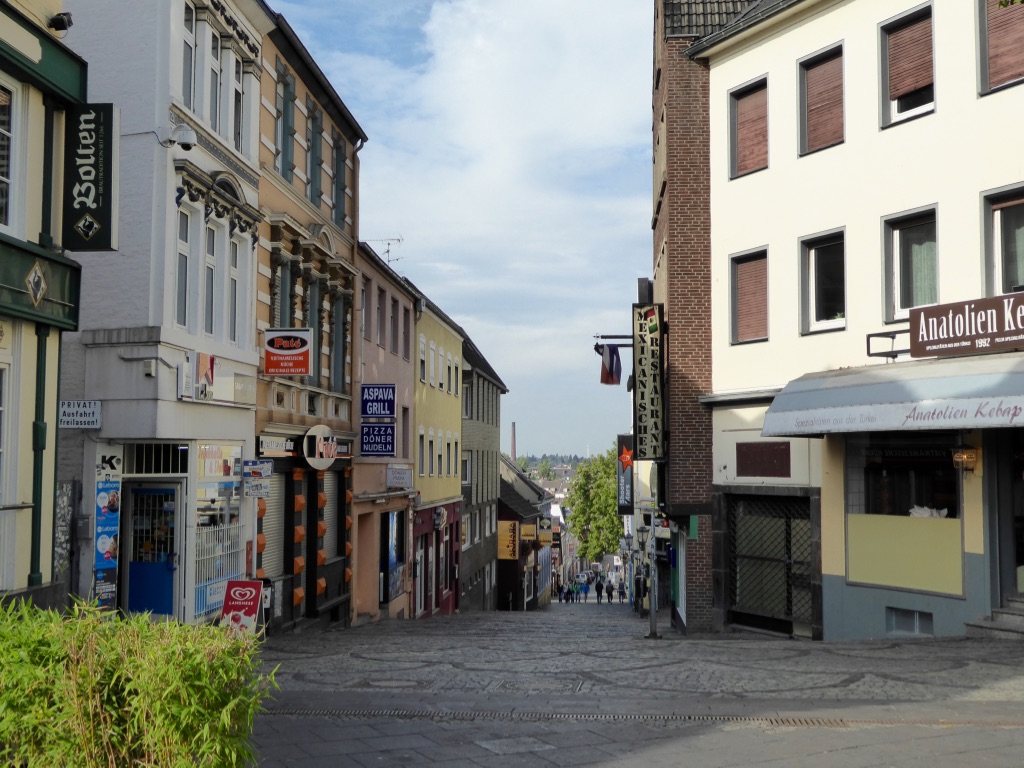by John Alder | Dec 3, 2018 | Bundesliga, Football history, German football books
These books will help you find out more about German football and make the most of your visit.
Are you planning a football trip to Germany?
This short guide will help you plan your trip and decide which clubs to visit. There is also key information on every club in the top three divisions as well as links to the best books, websites, blogs and podcasts.
Buy now from Amazon UK
Buy now from Amazon US
Bordered by the rivers Rhine, Ruhr and Lippe the Ruhrgebiet is one of Germany’s ‘hidden gems’. A vibrant, exciting and thoroughly modern metropolis, it is steeped in history and tradition.
For over 100 years it has also been the beating heart of German football.
This guidebook introduces its major cities and towns, the history, culture and traditions of its people and its football clubs. There is advice on how to plan a visit and where to find out more.
Buy now from Amazon UK
Buy now from Amazon US
And click here for more information
Borussia Mönchengladbach : an introduction sets out to share the history, tradition, triumphs and disappointments of this great club with the English-speaking world. The book tells the story of Borussia from its foundation in 1900 to the present day. As well as biographies of former players and managers and famous anecdotes, there is a wealth of background information for English speakers considering a visit to Germany or wanting to follow the club from afar.
Buy now from Amazon UK
Buy now from Amazon US
In 1904 a group of young miners from Gelsenkirchen got together to play football. They had very little money, no kit to wear, no ball to play with. They didn’t even have a pitch to play on. This book tells the story of how the club these young men formed grew to become FC Schalke 04, one of the biggest, wealthiest and best-known football clubs in the world.
Buy now from Amazon UK
Buy now from Amazon US
Bayer 04 Leverkusen is another big club with a rich and proud history. Founded in 1904 by employees of a local factory it has grown to become one of the most successful clubs in Germany.
Buy now from Amazon UK
Buy now from Amazon US
This short book tells the story of Fortuna Düsseldorf – one of Germany’s oldest and best-known football clubs. As well as describing the history, triumphs and disappointments of this historic club it also tells the life-stories of its best-known players and coaches.
It is also packed with practical information to help football fans plan a trip to Düsseldorf and get the most out of their time in the city and its region.
Buy now from Amazon UK
Buy now from Amazon US
And click here for more information
Are you planning a football trip to Germany?
This short guide will help you plan your trip and decide which clubs to visit. There is also key information on every club in the top three divisions as well as links to the best books, websites, blogs and podcasts.
Buy now from Amazon UK
Buy now from Amazon US
by John Alder | Oct 10, 2017 | Bundesliga, Football trips
The clubs of the German Bundesliga
Ground: BayArena
Capacity: 30,210
Average attendance 16/17: 28,428
Address: Bismarkstraße 122, 51373 Leverkusen
Colours: Red black
Nickname: die Werkself (works eleven – because of links to local pharmaceutical firm Bayer)
Ground: Signal Iduna Park
Capacity: 81,359
Average attendance 16/17: 79,653
Address: Sportweg, 44139 Dortmund
Colours: Black yellow
Nickname: BVB
Ground: Borussia-Park
Capacity: 54,067
Average attendance 16/17: 51,494
Address: Hennes-Weisweiler-Allee 1, 41179 Mönchengladbach
Colours: Green white black
Nickname: die Fohlen (the foals)
Ground: Commerzbank-Arena
Capacity: 51,500
Average attendance 16/17: 49,088
Address: Mörfelder Landstraße 362, 60528 Frankfurt am Main
Colours: Red black white
Nickname: die Adler (the eagles)
Ground: WWK Arena
Capacity: 30,660
Average attendance 16/17: 28,172
Address: Bürgermeister-Ulrich-Straße 90, 86199 Augsburg
Colours: Red green white
Nickname: die Fuggerstädter (after a famous local family)
Ground: Allianz Arena
Capacity: 75,000
Average attendance 16/17: 75,000
Address: Werner-Heisenberg-Allee 25, 80939 München
Colours: Red white
Nickname: der FCB, die Bayern (Bavarians)
Ground: Veltins-Arena
Capacity: 62,271
Average attendance 16/17: 60,703
Address: Arenaring 1, 45891 Gelsenkirchen
Colours: Blue white
Nickname: die Königsblauen (the royal blues), die Knappen (the miners)
Ground: Volksparkstadion
Capacity: 57,000
Average attendance 16/17: 52,341
Address: Sylvesterallee 7, 20525 Hamburg
Colours: Blue white black
Nickname: die Rothosen (the red shorts)
Ground: HDI Arena
Capacity: 49,000
Average attendance 16/17: 36,647
Address: Robert-Enke-Straße 3, 30169 Hannover
Colours: Black white green
Nickname: die Roten (the reds)
Ground: Olympiastadion
Capacity: 74,400
Average attendance 16/17: 50,267
Address: Olympischer Platz 3, 14053 Berlin
Colours: Blue white
Nickname: die alte Dame (the old lady)
Ground: Red Bull Arena
Capacity: 44,279
Average attendance 16/17: 41,454
Address: Am Sportforum 1, 04105 Leipzig
Colours: Red white
Nickname: die roten Bullen (the red bulls)
Ground: Schwarzwald-Stadion
Capacity: 24,000
Average attendance 16/17: 23,959
Address: Schwarzwaldstraße 193, 79117 Freiburg
Colours: Red white
Nickname: Breisgau-Brasilianer (Brazilians of Breisgau)
Ground: Weser-Stadion
Capacity: 42,100
Average attendance 16/17: 40,881
Address: Franz-Böhmert-Straße 7, 28205 Bremen
Colours: Green white
Nickname: die Grün-Weißen (the green-whites)
Ground: Wirsol Rhein-Neckar-Arena
Capacity: 30,150
Average attendance 16/17: 28,155
Address: Dietmar-Hopp-Straße 1, 74889 Sinnsheim
Colours: Blue white
Ground: Mercedes-Benz Arena
Capacity: 60,449
Average attendance 16/17: 50,515
Address: Mercedesstraße 87, 70372 Stuttgart
Colours: White red
Ground: Volkswagen Arena
Capacity: 30,000
Average attendance 16/17: 26,962
Address: In den Allerwiesen 1, 38446 Wolfsburg
Colours: Green white
Nickname: Die Wölfe (the Wolves)
Ground: Rhein-Energie Stadion
Capacity: 50,997
Average attendance 16/17: 49,571
Address: Aachener Straße 99, 50933 Köln
Colours: Red white
Nickname: Die Geißböcke (the billy goats)
Ground: Opel Arena
Capacity: 34,000
Average attendance 16/17: 29,096
Address: Egen-Salomon-Straße 1, 55128 Mainz
Colours: Red white
Nickname: Die Nullfünfer (the O-Fives)
Find out more about German football
Are you planning a football trip to Germany?
This short guide will help you plan your trip and decide which clubs to visit. There is also key information on every club in the top three divisions as well as links to the best books, websites, blogs and podcasts.
Buy now from Amazon UK
Buy now from Amazon US
by John Alder | Aug 25, 2017 | Bundesliga, German football stories
The new football season in Germany has started with controversy.
The ceremony of the opening second division game between VfL Bochum and FC St Pauli was drowned by loud booing, whistling and chanting.
At the start of all the opening Bundesliga games, fans from opposing teams united to abuse the football authorities (DFB) with chants of “Scheiß DFB”. Home fans unfurled banners spelling out grievances and threatening future action.
So what is making German football fans so unhappy?
Commercialisation
In theory, German football clubs are ‘owned’ by their fans. The “50+1” rule means that an individual or a company cannot control a club. Fans are directly involved in the running of their clubs. German football fans are proud of the traditional values of the game. They believe football is about much more than maximising profits and cite retention of standing areas in every ground and reasonable ticket prices as examples of the benefits of this approach.
They are worried about creeping commercialisation. The purchase by multinational Red Bull of a lower league club, which has led to the inexorable rise of Red Bull Leipzig appears to have by-passed the 50+1 rule. Fans believe Red Bull is simply using the football club to market its brand.
Similarly, there is no way village club Hoffenheim would have achieved Bundesliga status and success without the heavy investment of local billionaire Dieter Hopp.
And now Hannover 96 has applied for an exemption to the 50+1 rule so that President Martin Kind can own a majority share in the club.
Some fan groups are suspicious of the decision to allow a Chinese team U-20 team to compete in fourth tier Regionalliga Süd West. Although this will earn welcome cash for all teams in this league, it also gives the impression that football is being used to further commercial and political interests.
Fixtures scheduled to suit TV and not supporters
Fixtures are now spread over a full weekend and timings appear to be set at the convenience of sponsors and broadcasters rather than supporters. Since exact schedules are only announced a few weeks ahead it is very difficult for fans to plan. And sometimes it can be impossible for them to get to games. For example, VfL Bochum fans had to travel to Armenia Bielefeld on Monday 21 August for an 8.30pm kick-off.
On top of that, traditional fans really don’t like the non-traditional ‘entertainment’ now appearing at some grounds, which has nothing to do with football and appears to be aimed at people not even at the game.
Collective punishments
On several occasions last season the DFB imposed collective punishments on large groups of fans. When Dortmund played RB Leipzig last season a small number of Dortmund ‘Ultras’ attempted to block the away team bus and assaulted visiting supports. As a punishment the DFB ordered Dortmund to shut down the entire block for the next home game, effectively punishing 25,000 fans for the actions of a few.
Intrusive security
The football authorities are increasingly concerned about fan violence inside and outside grounds and the continued use of pyrotechnics by some fan groups. This has led to the introduction of personalised tickets and identity checks at turnstiles. For obvious historical reasons state intrusion into personal privacy is a highly sensitive issue in Germany
What next?
DFB President Reinhard Grindel appears to be listening. He has stated that there will be no more collective punishments and is seeking renewed dialogue with fan groups to address their concerns. He has also recognised that the success of German football is built on the commitment, loyalty and passion of supporters.
His statement has been welcomed by fan groups, but many fans remain highly suspicious of official motives and are still not convinced they are being taken seriously. Most commentators expect hostilities to continue throughout the season.
Find out more about German football
by John Alder | Mar 22, 2017 | Bundesliga, Football trips
We all know famous, well-supported and once-great clubs that have now fallen on harder times. The loyal, long-suffering fans of these sleeping giants still remember former triumphs and dream that one day their club will be back where it deserves to be. Now and then a strong start to the season, a string of good performances or the emergence of a talented player re-ignite the hope that this will be their year. Fans learn to live from a diet of mid-table mediocrity spiced up by occasional battles against relegation and runs for promotion. But the size of the club and numbers and passion of its fans lead everyone to think it could and should be doing better than this.
Fortuna Düsseldorf is just such a club. It was founded in 1895. And in the 1920s and 1930s was one of the top sides in Germany, winning the league and cup as well as providing players for the national side. In the 1970s and 1980s, it became a household name once more, achieving 16 years in the Bundesliga, two cup final wins, and a series of international appearances. But since the 1980s Fortuna has been what the Germans call an elevator side, moving up and down the leagues. At one point they fell as far as the fourth division before climbing right back to the top tier and were last in the Bundesliga in the 2012/13 season.
But Fortuna fans have stayed loyal through the bad times as well as the good. 12,000 fans bought season tickets at the beginning of the 2017/18 season and average attendance was 28,838 – third highest in the division.
And this loyalty has been rewarded. On the last day of the season, Fortuna Düsseldorf beat 1 FC Nürnberg to become second division champions and earn automatic promotion back to the Bundesliga.
Top level football has returned to the ESPRIT Arena
Getting to Düsseldorf
Flights
If you are coming over for a short visit, flying is the best option, and you can usually get a return flight for about £100.
Düsseldorf Airport
Düsseldorf has its own airport, which is about 15 minutes from the city centre. There are flights here from Birmingham, London Stanstead, London Heathrow, London Gatwick, Manchester, Cardiff, Glasgow and Newcastle. A platform for the S11 train line, which will take you right into the city centre in about ten minutes, is right next to the arrivals gate. Alternatively, if you follow the signs for the Skytrain, a .. will take you in five minutes to the airport station where you get a wider choice of trains.
Cologne Bonn Airport
There are flights here from London Heathrow, London Stanstead, Manchester and Edinburgh and a station right in the middle of the airport. There are direct trains to Düsseldorf and the journey will take about 30 minutes.
Travelling in the region
Düsseldorf belongs to an integrated public transport system managed by an organisation called VRR. You can use VRR tickets on any regional and local train, tram, underground and bus across the entire network. The VRR website explains in English how it all works.
Tickets
Games rarely sell out and so you can buy tickets on the day. But if you want to avoid queues, the best thing to do is go to the club shop on Burgplatz or the tourist information office opposite the station. There will be somebody there who can speak English and advise you on the best place to sit.
You can also order your tickets before you set off at the online shop.
Your ticket will entitle you to free travel to and from the ground.
Getting to the ground
The journey to the ESPRIT Arena could not be more straightforward. You simply hop on the U78 underground train which will take you directly to the stadium in about 20 minutes.
Inside the ESPRIT Arena
The ESPRIT Arena was opened in 2004. It has room for 54,600 fans (9,917 standing) and is used for international matches as well as concerts and other sporting events.
There is a retractable roof, which is deployed in bad weather, and a unique central heating system ensures that even in winter the temperature in the stands is at least 15 degrees.
As you would expect it is a very modern and comfortable stadium with plenty of indoor spaces and outlets for food and drink. There is also a fan shop selling scarves, shirts and memorabilia.
You can pay with cash and so you don’t need a pre-paid card. But if you buy a beer you have to pay a deposit for your glass.
After the game
Düsseldorf is large, modern city full of museums, galleries and parks, as well endless opportunities for shopping in fashionable department stores and elegant malls. And they say the Düsseldorf Altstadt is the longest bar in the world. So you are spoilt for choice.
You might want to try these before or after the football:
1. Spend some time at Uerige in Rheinstrasse.
This is a famous pub which brews its own beer called Alt. They also serve traditional Düsseldorf food. You can sit down inside if you want, but there is usually a big crowd of people outside as well. You get your drinks from waiters who come round with regular refills. While you are there, go round the corner. You will see people buying drinks from a little window beside a shop. This is Killepitsch – a local liqueur, which is said to be good for the digestion.
Directions: Just follow the signs for the Altstadt from the station. It will take you 15 minutes to get there.
2. Take the underground (U79) to Kaiserswerth.
This quiet town is about 15 minutes from the city centre. You can take a walk along the Rhine, have coffee and cakes (Café Schuster opposite the platform, Bäckerei Norgel on your left in the marketplace), have a typical pub meal and a beer (Bierhaus zum Einhorn in the marketplace) or just wander around. The snack bar on the platform is called Berliner Imbiss. It is said to do the best Bratwurst in Düsseldorf. There are also regular boats between the city centre and Kaiserswerth, so you might want to go back on the river. If you go back by underground, get out at Heinrich Heine Allee and take a walk through the Altstadt.
3. Take the underground (U74, U77, U75 or U76) to Oberkassel
This prosperous part of town is on the other side of the river. Get off at Barbarossaplatz and then walk back over the Oberkasseler bridge. You get a superb view of the Düsseldorf waterfront. Once you are back on the other side, keep walking towards the Altstadt. There is a row of restaurants and bars right on the river bank where you can get a decent meal. Or you might just want to watch how Germans unwind and enjoy themselves.
4. Visit the Mediahafen
This used to be the docks area, but the old warehouses have been converted into modern flats, offices and restaurants, or replaced by fascinating and quirky modern buildings.
Directions: You can walk there along the river from the Alstadt in about 15 minutes.
Other posts you might like
Find out more about German football
Books about German football
by John Alder | Feb 16, 2017 | Bundesliga, Football trips
The perfect introduction to the German football experience
Borussia Mönchengladbach is the ideal destination for a football weekend in Germany.
- It is the fourth best-supported club in the country, and regularly attracts over 50,000 noisy and passionate fans.
- The atmosphere inside the BORUSSIA-PARK stadium will raise the hairs on the back of your neck.
- You will see very an attractive, high-tempo, attacking style of football.
- The city and ground are really easy to get to – the only tricky thing about going to Mönchengladbach is saying the name.
If you do decide to come and watch Borussia, I hope this short post will help you get the most out of your visit.
Tickets
Many games are completely sold out, so it’s a really good idea to buy tickets before you come to Germany. This will also save you money as your ticket entitles you to free match day travel to and from the ground on local transport.
These are the best ways to get hold of tickets for Borussia Mönchengladbach:
- Use the online ticket shop. Although everything is in German, the ticket portal is easy to use.
- Call the ticket hotline (0039 1806 181900). There will always be someone who can speak to you in English and advise you on the best place to sit.
- Send an email to the club explaining what you want (info@borussia.de).
Getting to Mönchengladbach
Mönchengladbach’s location makes it very straightforward to get to from outside Germany. It very close to the border with Holland, within easy reach of four airports and part of a reliable, cheap and fully integrated regional public transport system.
If you are coming over for a short visit, flying is the best option, and you can usually get a return flight for about £100.
Düsseldorf Airport
There are flights here from Birmingham, London Stanstead, London Heathrow, London Gatwick, Manchester, Cardiff, Glasgow and Newcastle. The airport has a station where you can catch a train to Düsseldorf, from where you can continue to Mönchengladbach.
Weeze Airport
There are flights here from London Stanstead, London Luton and Edinburgh. Regular shuttle buses take you to nearby stations where you can get a train to Düsseldorf.
Cologne Bonn Airport.
There are flights here from London Heathrow, London Stanstead, Manchester and Edinburgh and a station right in the middle of the airport. It’s a bit further away, but there are direct trains to Mönchengladbach.
Eindhoven Airport
Although it’s in Holland, Eindhoven is only 60 miles from Mönchengladbach. There are Ryanair flights here from Manchester and London. You could then continue by hire car. BORUSSIA-PARK is close to the A74 motorway and very easy to find. Or you can travel by train to Venlo and then change for Mönchengladbach.
A more leisurely way to get here would be by train – take the Eurostar from London St Pancras to Brussels, change there for Cologne and then continue to Mönchengladbach. This costs about £150.
If you are not in a hurry, National Express will take you from London to the region by bus for about £40 return. But be prepared for a very long journey!
Mönchengladbach is on the western edge of an integrated public transport system managed by an organisation called VRR. You can use VRR tickets on any regional and local train, tram, underground and bus across the entire network. The VRR website explains in English how it all works.
And remember – on match days your ticket entitles you to free travel to and from the ground across the entire region.
Where to stay
The big advantage of staying in Mönchengladbach is that you can enjoy the build-up to the game, don’t need to rush off after the final whistle and you can mix with Borussia fans in the evening.
The B&B Hotel is very reasonably priced and just behind the station. On match days, it is full of German, Dutch and British Borussia fans.
Slightly more upmarket establishments include the Leonardo Hotel and the Dorint Park Hotel are a bit more expensive.
For anyone looking for a wider choice of things to do and places to go before and after the football, Düsseldorf is only 35 minutes away by train. There are hotels there to match every budget. The Düsseldorf Tourist Information Office provides advice and a booking facility here.
There is a large bus station In front of the station in a square called Europaplatz. On your right, you will see a pub called Humboldt-Schänke. This is a popular meeting place for Borussia Mönchengladbach fans.
If you go to the left of Europaplatz you will come to a street called Hindenburgstraße. This takes you to the main shopping centre, and it is lined with cafes, snack bars and restaurants. After about 200 meters you will come to a swish new shopping mall called Minto. There is a Borussia fan shop inside.
Getting to the ground
BORUSSIA-PARK is a long way from the city centre, but getting there is not a problem. On match days, shuttle buses take fans to the ground from behind Mönchengladbach station. This service also picks fans up outside Rheydt station (opposite Platform 4). The same buses take you back into town after the game.
I would advise you to travel to the ground well before kick-off. This will give you time to visit the FanHaus and the beer garden.
The FanHaus is just beyond the carparks at the southern end of the stadium. It is run by and for the fans. It has bars, food outlets, TV screens, music as well as indoor and outdoor seating areas. On matchdays, it is heaving with fans of all ages eating Bratwurst, drinking beer, singing and chanting. Look out for the Liverpool bar, which celebrates a longstanding friendship between fans of the two clubs.
The beer garden is right next to the ground, in front of the club shop. Next to stalls selling food and drink there are benches and tables where thousands of fans gather before every game.
Inside BORUSSIA-PARK
Unlike many Bundesliga grounds, you can use cash to buy food and drink inside the ground. There are outlets on every level and block selling soft drinks, beer, tea and coffee, as well as a wide variety of fast food including, of course, chips and sausage.
You do need to pay a one euro deposit for your beer glass, which you can get back at the end of the game.
After the game
It is well worth staying after the final whistle to see the players salute the crowd, and perhaps to have one last beer. If you are staying in Mönchengladbach, you will have no problem finding somewhere to eat and drink in the Alter Markt, or the nearby old town.
Find out more about German football
Books about German football
by John Alder | Nov 21, 2016 | Bundesliga, Football, Germany, Travel
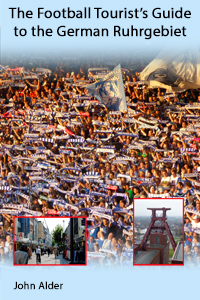
Introducing the German Ruhrgebiet
Bordered by the rivers Rhine, Ruhr and Lippe the Ruhrgebiet is one of Germany’s ‘hidden gems’. A vibrant, exciting and thoroughly modern metropolis, it is steeped in history and tradition. For over 100 years it has also been the beating heart of German football.
My latest guidebook introduces its major cities and towns, the history, culture and traditions of its people and its football clubs. There is advice on how to plan a visit and where to find out more.
A region transformed
They used to say that you could never see the sun in the Ruhrgebiet because the clouds of smoke and dust blocked out the sky. Hanging your washing up outside was a waste of time. It would end up covered in soot and dirtier than before you started. Little animal or plant life survived in the rivers and canals and you wouldn’t think of going for a swim.
If you lived and worked in the Ruhrgebiet you had a lower life expectancy than anywhere else in Germany. You had higher chance of dying young from lung diseases. You were more likely to live in crowded accommodation and to have a dangerous and exhausting job.
Today’s Ruhrgebiet is completely transformed. The coking plants, blast furnaces and engine towers are all silent. The toxic emissions from thousands of chimneys have disappeared. The air is clean. Nature has begun to reclaim the vast tracts of land that were once occupied by sprawling industrial plants. City centres are attractive, dynamic, modern places. The arts are flourishing.
But the region’s industrial past has not been swept aside. People are proud of the bravery and sacrifices of those who came before them. They value history and tradition. Former industrial sites have been imaginatively repurposed as cultural or entertainment centres or preserved as memorials to the past.
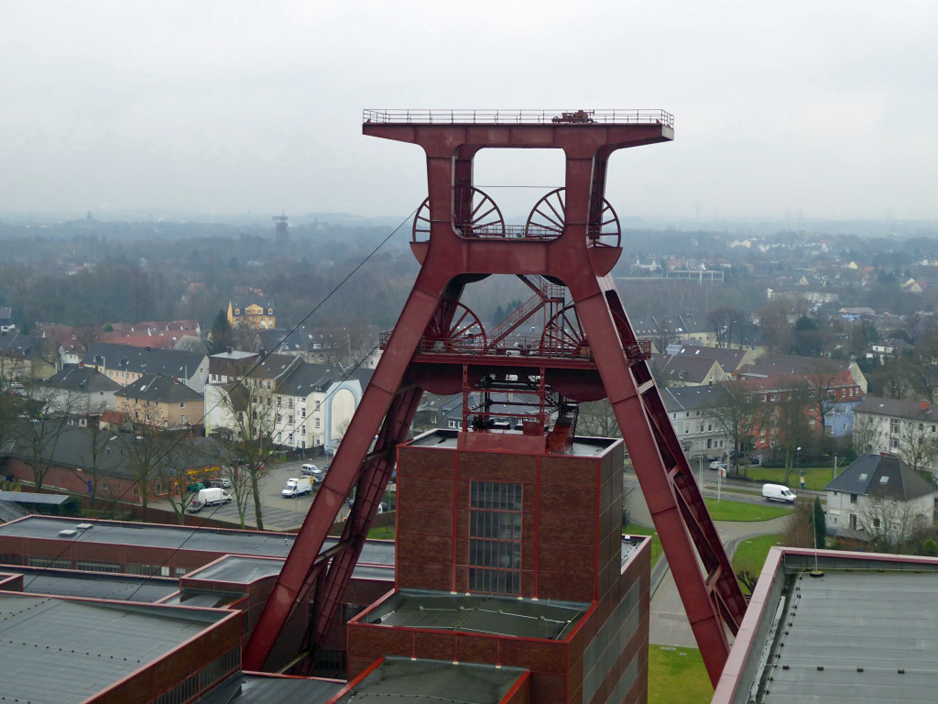
Zollverein used to be a coking plant. Now it’s a world heritage site
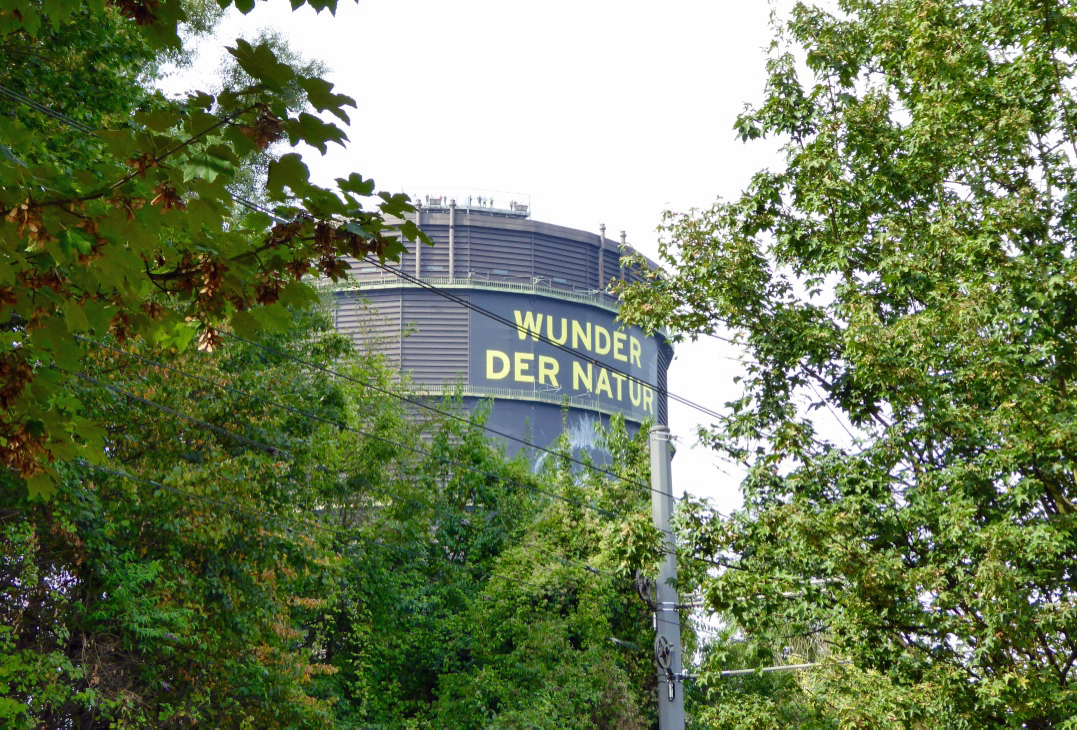
The gasometer in Oberhausen is now used for exhibitions
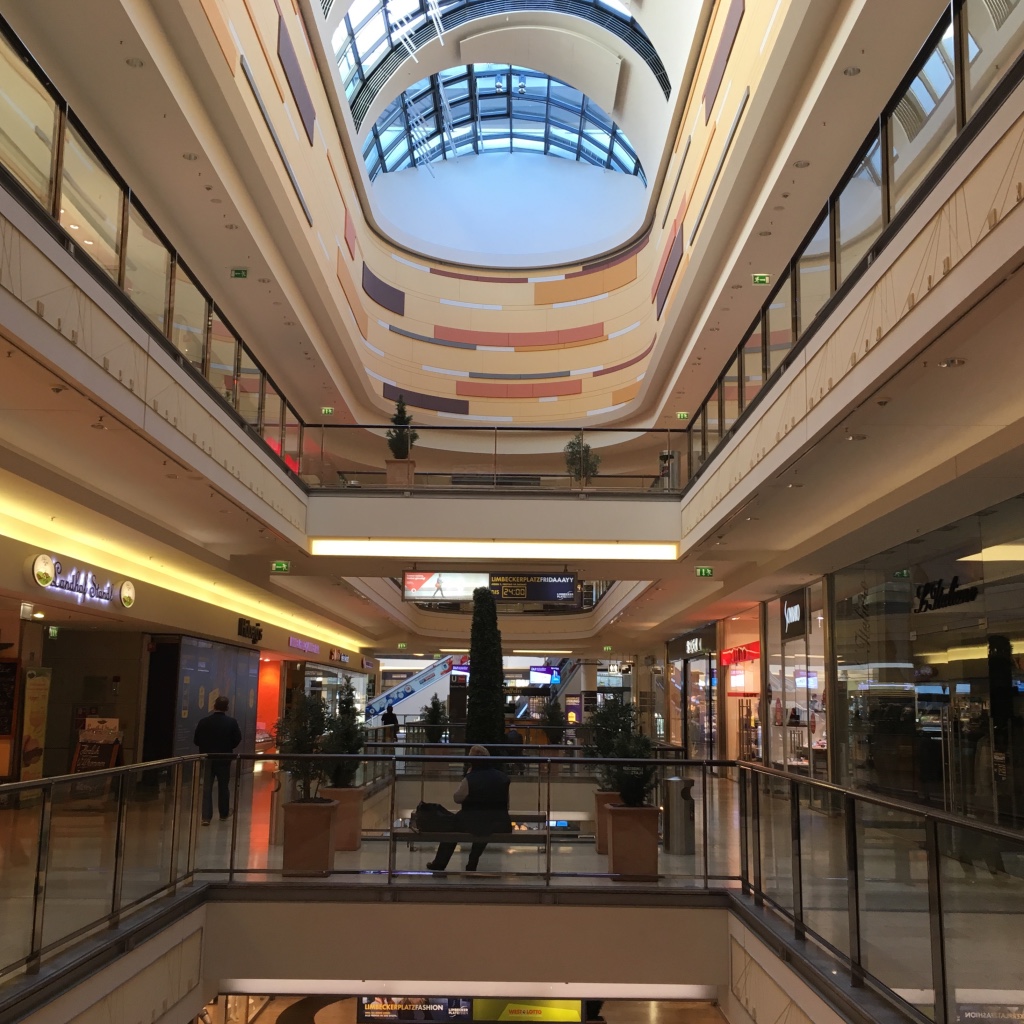
Limbeckerplatz Shopping Mall in Essen
The epicentre of football
You can’t really understand the Ruhrgebiet without understanding its football. And you can’t talk about German football and ignore the Ruhrgebiet.
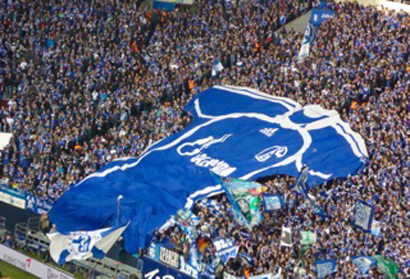
Fans at FC Schalke 04
For more than 100 years this region has been one of the biggest and most important footballing centres in the world. Only London has as many teams and players and as high a concentration of clubs and stadiums as here.
The region’s sporting success is also second to none – at national and international level.
A Ruhrgebiet club was the first to win cup and league in the same year. A Ruhrgebiet club won the first European Cup and then decades later brought the first Champions League title to Germany. A Ruhrgebiet player scored the winning goal in Germany’s first world cup final.
Two of the world’s wealthiest clubs are Ruhrgebiet neighbours. For decades exciting, talented players have emerged from the region’s football academies and gone on to dazzling local, national and international success. (Manuel Neuer, Marco Reus, Mezut Ozil are just three very recent examples).
There is also no other region in Germany where football is so closely linked to the rhythms of daily life, to family, friendship and community.
A guide for the football tourist
This book introduces the towns, cities and people of the Ruhrgebiet from the perspective of the football fan. It outlines the major sights and makes practical suggestions about where to go and how to get there. It also presents the region’s football clubs. It describes their triumphs and disappointments, tells the stories of famous players and coaches and celebrates fan culture.
There is information and advice for anyone wanting to come and experience this exciting region in person. But there are also plenty for anyone simply wanting to find out more or follow the region’s football from afar.
Click here to order your copy
